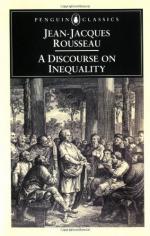
|
| Name: _________________________ | Period: ___________________ |
This test consists of 15 multiple choice questions and 5 short answer questions.
Multiple Choice Questions
1. What does Rousseau believe would return humans to the original state of society?
(a) Giving up power.
(b) Incomplete passion.
(c) Complete idleness.
(d) Complete desire.
2. How does Rousseau want to live and die?
(a) In solitude.
(b) Freely.
(c) With power.
(d) With love.
3. What does luxury generate according to "Chapter 2, A Discourse on the Moral Effects of the Arts and Sciences, Part II"?
(a) Time wasted.
(b) Power.
(c) Greed.
(d) Social classes.
4. Who spread knowledge to the masses, according to Rousseau?
(a) Textbook writers.
(b) Priests.
(c) Kings.
(d) Historians.
5. What does Rousseau think the government and society can have?
(a) Opposing goals.
(b) The game goals.
(c) Opposing interests,
(d) The same beliefs.
6. What do people seek that do not exist, according to Rousseau at the end of Chapter 2, "A Discourse on the Moral Effects of the Arts and Sciences, Part II"?
(a) Power.
(b) Love.
(c) Money.
(d) Remedies.
7. Which of the following does Rousseau NOT want the youth to seek?
(a) Pleasures.
(b) Repentance.
(c) Luxury.
(d) Light.
8. What should mans' response to the effects of art and science on society be, as described by Rousseau?
(a) Men should be humiliated by this.
(b) Be humbled by it.
(c) Embrace it.
(d) Be proud of it.
9. What does Rousseau argue at the beginning of "Chapter 2, A Discourse on the Moral Effects of the Arts and Sciences, Part II"?
(a) That the arts are corrupt.
(b) Many civilizations believe that art arose from an enemy of humanity.
(c) That the government is corrupt.
(d) Many civilizations believe that science arose from an enemy of humanity.
10. What does Rousseau consider to see if the contradiction he found was true?
(a) The arts and sciences.
(b) The wealth of the state.
(c) The church.
(d) The government.
11. What civilizations does Rousseau follow to track the decline of morality?
(a) The Romans and Greeks.
(b) The Germans and Irish.
(c) The Romans and Germans.
(d) The English and Greeks.
12. What was the state of France, according to Rousseau, as a result of the introduction of the arts and sciences?
(a) They discovered that they were better off in their ignorance.
(b) The arts and sciences were only a luxury.
(c) The needed the arts and sciences.
(d) The arts and sciences were a detrimental luxury.
13. The arts and sciences have helped human beings to repress what according to "Chapter 1, A Discourse on the Moral Effects of the Arts and Sciences, Part I"?
(a) Their narcissism.
(b) Their kindness.
(c) Their wickedness.
(d) Their infatuation.
14. How are virtue and learning related according to "Chapter 1, A Discourse on the Moral Effects of the Arts and Sciences, Part I"?
(a) They are polar opposites.
(b) They are contradictory.
(c) One must learn to understand virtue.
(d) Virtue exitsts without knowledge of it.
15. What does Rousseau see as possibly contradictory in "Chapter 1, A Discourse on the Moral Effects of the Arts and Sciences, Part I"?
(a) Virtue and learning.
(b) Morality and learning.
(c) Virtue and morality.
(d) Learning and ignorance.
Short Answer Questions
1. How many natural principles does Rousseau see in humanity at the end of "Chapter 3, A Discourse on the Origin of Inequality, Dedication and Preface"?
2. What created ethics according to Rousseau?
3. What type of government worries Rousseau?
4. Slavery makes people tend to be what according to "Chapter 1, A Discourse on the Moral Effects of the Arts and Sciences, Part I"?
5. Describe what Rousseau felt the following did NOT do for human morals in regard to the arts and sciences.?
|
This section contains 547 words (approx. 2 pages at 300 words per page) |

|




